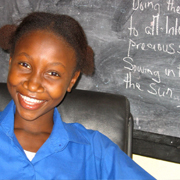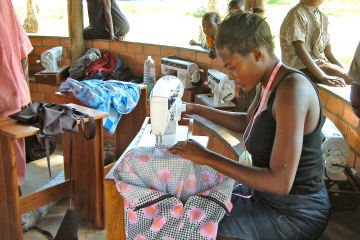Education for men, but what about women?
Disrespect and discrimination towards women is a part of everyday life in many countries and cultures and is one of the main topics of this year’s International Women's Day, 8th March 2007. For many women, it cannot be assumed that they can live independently and actively participate in society, economics or politics. One of the main reasons why women are at such a disadvantage is that they do not have equal rights in terms of education. SOS Children stands up for better education opportunities for girls and women around the world and helps them enjoy their right to an education thanks to our schools and education programmes.
In many countries, girls are exploited, abused and discriminated against purely because of their gender. There is no country where girls and women have exactly the same opportunities as men.
Around the world women own only 1% of farmland and 75% of those classed as poor are women. It is vital that women receive an education to improve their status in society. The Member States of the United Nations also came to this conclusion in September 2000, when they set a target for the new millennium that by 2005 just as many girls as boys would be provided with an education. We must now recognise the fact that very little has actually changed: a child without any form of education is in all probability still going to be a girl, not a boy. Globally, there are twice as many women as men who are neither able to read nor write.

24,000 girls in 450 SOS Children's Villages worldwide have equal opportunities to education
One of the main aims of our 450 SOS Children's Villages is to ensure that the 24,000 girls in our care receive the same education opportunities as boys. Moreover, 80,000 children and young people worldwide are currently being taught in 190 SOS Schools. We are very proud of the fact that the proportions of girls and boys are almost the same: 47% of the pupils are girls. And that is the case even though in many regions girls are not necessarily sent to school as a matter of course. Many stay at home because they have to help to run the house or help with the farm, or because their parents can only pay or sometimes only want to pay for their sons to go to school.
The traditional role of the women is that of wife, mother and housewife. As soon as she falls out of this mould because she has her own plans, or is single or widowed, she will only manage to find work and remain healthy if she has received an education. In many countries, women need a lot of courage and strength if they want to go against traditional customs and roles and receive vocational training to take control of their own lives. SOS Children equips 4,300 of these courageous women with the skills for an independent life through our vocational training centres around the world.

Education is a prerequisite for self-confidence
Education and training are usually directly associated with opportunities on the labour market. But for many women it is often a prerequisite for something a lot more fundamental: self-confidence. Only a woman with self esteem is ready for change and is in a position to fight for her dreams and ideals. This is precisely where SOS Children's family-strengthening programmes, specifically aimed at women, come in. "We help and encourage women to organise themselves, to exchange ideas and opinions and obtain further training," explains Isabel Poma, director of the SOS Social Centre in El Alto, Bolivia. It is only when they exchange ideas and opinions with others that the women begin to believe that they can change their lives.
Self-confident and well-educated women have healthier children
There is no doubt that education and equal rights for women also have an influence on the wellbeing of their children. Self confident and educated women have healthier children who they support in their education and finding their way in life. Manoj Dash is the project director of SOS Children's mother strengthening programme in India, which specifically targets single mothers: "An adult woman with children who has no husband or education has a hard time in India's patriarchal society. Single mothers often do not mange to register their children officially, which means that they and their children lose any right that they have to support from the state or to a state education." SOS Children tries to integrate these women and their children back into society: training programmes enable the women to find a way into work, learning centres prepare children who have never been to school so that they can enter into the state school system and the families are given support when dealing with the authorities, which helps them to get back into the state system.